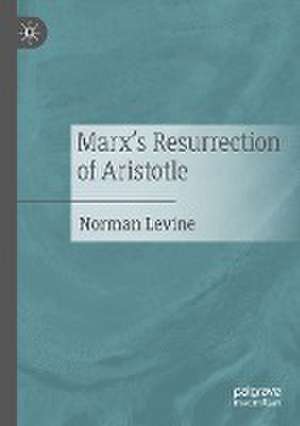Marx's Resurrection of Aristotle
Autor Norman Levineen Limba Engleză Paperback – 25 ian 2022
Showing how classical humanism is the dominant ethos in the communism of Marx, the book includes chapters on:
- Hegel as a transition point between Aristotle and Marx
- The links between Marx’s theory of labor and Aristotle’s idea of the constitutive subject located in The Politics
- How the local methodologies of Aristotle and Hegel provided Marx with the social methodologies by which to interpret the functioning of capitalism
| Toate formatele și edițiile | Preț | Express |
|---|---|---|
| Paperback (1) | 729.06 lei 6-8 săpt. | |
| Springer International Publishing – 25 ian 2022 | 729.06 lei 6-8 săpt. | |
| Hardback (1) | 645.62 lei 38-44 zile | |
| Springer International Publishing – 25 ian 2021 | 645.62 lei 38-44 zile |
Preț: 729.06 lei
Preț vechi: 889.09 lei
-18% Nou
Puncte Express: 1094
Preț estimativ în valută:
139.50€ • 146.05$ • 115.43£
139.50€ • 146.05$ • 115.43£
Carte tipărită la comandă
Livrare economică 08-22 aprilie
Preluare comenzi: 021 569.72.76
Specificații
ISBN-13: 9783030570378
ISBN-10: 3030570371
Ilustrații: XIII, 354 p.
Dimensiuni: 148 x 210 mm
Greutate: 0.49 kg
Ediția:1st ed. 2021
Editura: Springer International Publishing
Colecția Palgrave Macmillan
Locul publicării:Cham, Switzerland
ISBN-10: 3030570371
Ilustrații: XIII, 354 p.
Dimensiuni: 148 x 210 mm
Greutate: 0.49 kg
Ediția:1st ed. 2021
Editura: Springer International Publishing
Colecția Palgrave Macmillan
Locul publicării:Cham, Switzerland
Cuprins
1. Introduction.- 2.The Tyranny of Greece over Marx.- 3. The Restoration of Civic Humanism.- 4. The Pneumatology of Labor.- 5. Marx's Pneumatology of Labor and His Method of Explanation.- 6. Aristotle and Hegel as the Co-Authors of Das Kapital.- 7. The Ethical Basis of Communism.
Notă biografică
Professor Norman Levine received his Ph.D. from New York University. He was a member of the faculty at DePauw University and then transferred to the University of Maryland Baltimore County where he was promoted to Full Professor and from which he retired in 1980. He has published thirty seven scholarly articles and eight previous books. He is the recipient of numerous research grants, including two Fulbright Senior Research Fellowships. Among other institutions, Professor Levine was invited to lecture at the Free University of Berlin, Cambridge University, and from 1990 to 2016 for two months each year at the University of Beijing.
Textul de pe ultima copertă
This book seeks to show how Karl Marx’s vision of communism was a continuation of Aristotle’s classical humanist philosophy. Challenging the Engelsian distortion of Marx, it presents a negation of previous interpretations of Marx which present him in materialist terms. Engels proposed a picture of the highest stage of communist society as an economic egalitarianism, a vision which became an axiom of Leninist-Stalinist-Soviet Communism. By contrast, here it is shown that Marx embraced the Aristotelian concept of “distributive justice”, of proportionate equality. Spanning the works of Marx, from his university education and doctoral dissertation on the differences between the Democritean and Epicurean philosophy of the atom, to the study of his Rheinische Zeitung period and the persistence of classical humanism in Marx’s defense of the freedom of the press, Levine skillfully reveals the gravitational pull between Marx and Aristotle.
Showing how classical humanism is the dominant ethos in the communism of Marx, the book includes chapters on:
- Hegel as a transition point between Aristotle and Marx
- The links between Marx’s theory of labor and Aristotle’s idea of the constitutive subject located in The Politics
- How the local methodologies of Aristotle and Hegel provided Marx with the social methodologies by which to interpret the functioning of capitalism
Caracteristici
Shows how Karl Marx’s vision of communism was a continuation of Aristotle’s classical humanist philosophy Presents a negation of previous interpretations of Marx which present him in materialist terms Illuminates how the local methodologies of Aristotle and Hegel provided Marx with the social methodologies by which to interpret the functioning of capitalism
